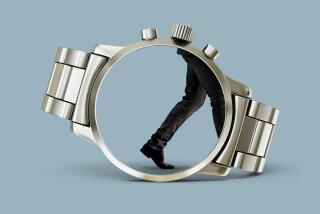The new definition of arm candy
- Share via
The diners at a round table in the epicenter of Spago’s roofless front courtyard emit a power buzz that surrounds them like a force field. An actor, an agent, two managers and a pair of European businessmen, they have gathered for an unusual sort of boys’ night out. After dinner, they will not attend a sporting event together, or drop in at a strip club. Late into the evening, they will compare notes on their shared obsession with a particular brand of wristwatch.
Contrary to cliche, a Y chromosome and the shopping gene are not entirely incompatible. In the last three or four years, a growing legion of successful American men who had previously restricted their discretionary purchases to hot cars and electronic toys have become collectors of Panerai watches.
Their Panerai passion is epic. Manager Jeff Wald, who has four models and has his eye on two more, says, “I don’t know anyone who has just one. If you have one, you have five or six.” The round-faced, oversized Panerai has supplanted, in spirit, if not in numbers, the Rolex, Cartier, Piaget and every other pricey timepiece that seeks to claim status-conscious buyers.
The Panerai’s rapid rise is a triumph of classic design, marketing strategy and serendipity. Officine Panerai was founded in 1860 in Florence, Italy, and its only customer for most of the 20th century was the Italian navy, for which it made precision instruments and underwater watches. Only 300 diving watches were produced between 1938 and 1993, when the company began selling to the public. By the time it ceased being a military secret, the Panerai -- big, handsome and unmistakably macho -- had provenance, obvious utility and exclusivity.
None of this was lost on the Richemont Group, a luxury-goods conglomerate that bought the brand in 1997. It had already been demonstrated that if Helen of Troy were a watch, she’d be the Panerai: One look and men had to have her. Sylvester Stallone, for example, was smitten in Rome.
At the dinner table at Spago, talk of the incredible lightness of titanium models, limited editions and interchangeable bands ceases as Angelo Bonati, the Milan-based Panerai chief executive, tells the story. Stallone was in Rome in 1995, shooting the action-adventure “Daylight.” He bought himself a Panerai, then asked the company to produce a limited edition of 200 called the Slytech, featuring his signature engraved on the back.
Wald knows just how Stallone felt when he wanted a Panerai, then 200 more. The agent had lunch with his old friend after the actor returned from Italy. “I couldn’t find the watch here, so when I was in London, I went to the biggest watch store in town,” he recalls. “They said there was a 6-month waiting list. For me, instant gratification takes too long, so I had my office search for one till they found it. I wasn’t going to wait.”
Not all Panerai roads trace back to Stallone. The source of the cachet the watch has acquired is difficult to pinpoint. Franck Verhaeghe, who did not attend the Spago dinner but styles the hair of a select group of men and women at the Joseph Martin salon on Rodeo Drive, asks, “Is there like a memo that goes around that says, ‘If you’re in the know, this is the watch you should wear now?’ I was at the Four Seasons Hotel in Milan about three years ago, and every man there was wearing blue jeans, a blue Oxford shirt and that watch. Then I came back to L.A. and a few months later I started seeing them here.” Richard David Story, editor in chief of Departures, a magazine sent to American Express platinum card-holders, had a similar European experience. “About two years ago in Florence, I noticed that all the heads of the Italian fashion companies were wearing Panerais,” he says. “Then I went to Courcheval, in France, for a ski story, and started noticing the watches there, on people and in all the best jewelry stores. It projected an image of Panerai, International Watch of Mystery. Since then, it has just exploded. It’s the Swatch of the upper class.”
New Panerais sell for $2,500 to $25,000. “It isn’t a Timex,” Wald says. “But it isn’t the most expensive watch you can buy. There’s a reverse snobbery to it.”
On the streets of Shenzen, a Chinese village about 40 minutes outside Hong Kong, faux Panerai watches are ubiquitous. “You can always tell which luxury goods are hot by seeing what’s selling in Shenzen,” says Laura Wenke, senior vice president of Lane Crawford, Hong Kong’s most elegant specialty store. “I went there recently to do some reconnaissance. You could get the Cartier styles that have only been out for five minutes, and Panerai knockoffs for $30.”
Adam Sher, a William Morris agent and vice president who bought his first Panerai three years ago, has found that the watch is an instant conversation piece, and anyone wearing one becomes a member of a brotherhood. He met Philippe Bonay, president of Panerai, North America, at the Beverly Wilshire Hotel. “I was there for a business meeting and noticed four people sitting together, all wearing Panerai watches. So I went up to Philippe and we just started talking. You notice the watch because it’s distinctive and large, but it isn’t flashy,” he says.
How big is it? From 40 to 47 millimeters in diameter. The Rolex Daytona, another oversized watch that had its own waiting lists two years ago, measures 38 millimeters across its face. Although the Panerai probably wouldn’t relish being known as the large-print watch for presbyopic baby boomers, some owners consider its large, easy-to-read numbers a benefit. “When I was 45, I had to get reading glasses, because my arm was too short,” Wald says. “I can see my Panerai without glasses, and it glows in the dark.”
Marketers of products as diverse as video games, cars and designer handbags know that some perverse human quirk intensifies the desire for anything that seems unattainable. Panerai keeps its production at half the level of consumer demand, Chief Executive Bonati says. A limited network of jewelers who handle the watches receive only a few each, and even the flagship boutique in Florence stocks only 25 to 30 models of the more than 40 styles the company makes.
Arnold Schwarzenegger is one of L.A.’s most visible Panerai devotees, and there’s a stylistic consistency to his affection for the watch. After all, he was the civilian who popularized the Hummer, and Panerais could be seen as the Hummer of male accessories. “Given what’s going on in the world right now, the Panerai’s military background counts for something,” Story says. “A wimp can wear one and it suggests something more than wimpdom.”
Chi McBride, the 6-foot-5 actor who plays the high school principal on “Boston Public,” first saw the Panerai on Schwarzenegger at a cigar bar in Beverly Hills. He rises from the dinner table, moving away from the detritus of plates of beef, a manly man’s entree that three of the Panerai faithful ordered. In a basso profundo to rival Barry White’s, he says, “This watch. It’s got a thinnnnng.”
More to Read
Inside the business of entertainment
The Wide Shot brings you news, analysis and insights on everything from streaming wars to production — and what it all means for the future.
You may occasionally receive promotional content from the Los Angeles Times.










